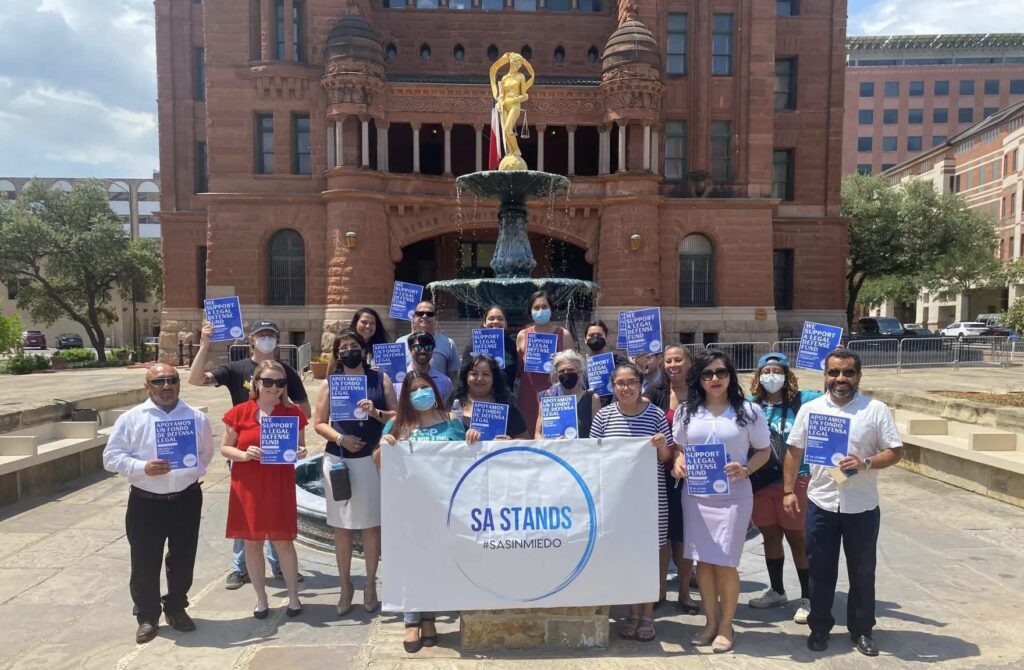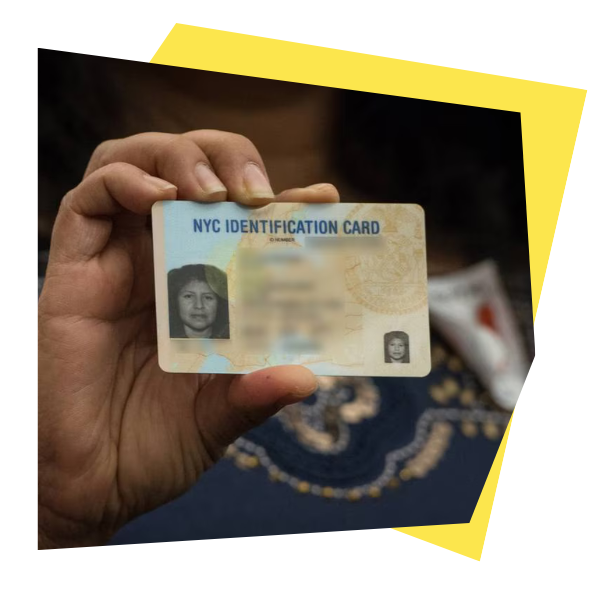
In honor of the many people arriving, settling down, and building new lives in localities across the country and the communities welcoming them with open arms, this month’s newsletter will focus entirely on the work our network is doing to advance immigrant justice.
Localities are investing in legal representation for immigrants
Everyone – regardless of immigration status – should have the right to an attorney and legal services they need to navigate our immigration system. We know that people seeking asylum who don’t have legal representation are far more likely to be deported. We also know that there are serious gaps in our legal system – particularly in regards to the availability and accessibility of legal services for folks without documentation. Localities are stepping in to help. This month, Bexar County, TX approved $1 million to establish an immigrant legal defense fund, proposed by Bexar County Commissioner Justin Rodriquez. In Los Angeles, the city council recently voted unanimously to move forward with the implementation of RepresentLA, a program to provide various legal services to the city’s immigrant community, including legal representation. The initiative was spearheaded by LA City Councilmembers Kevin de León and Monica Rodriguez. Last month in Chicago, The Resurrection Project launched a fellowship to train non-lawyers as representatives in immigration cases to strengthen the capacity of community-based legal aid organizations. Additionally, Portland, Oregon used funds from the American Rescue Plan Act to support legal assistance for immigrants and new arrivals. And all across the country, local leaders have been calling on their states to prohibit local government agreements to detain immigrants in their jails on behalf of federal immigration authorities. After months of local advocacy, Colorado became the seventh state to do so last month. Read more →
In the absence of humane federal and state policy protecting immigrants and new arrivals, it’s up to local leaders to step up. Below are a variety of resources to help support the work you’re already doing to choose welcome and advance immigrant justice in your communities:
- Local Progress Impact Lab: Local Power to Choose Welcome: Supporting New Arrivals with Dignity
- Vera: Advancing Universal Representation Toolkit
- NPNA: Title 42 Sunset: Narrative & Messaging Framework
- NPNA: ‘Always Welcome’ Toolkit
- New York Immigration Coalition’s (NYIC): ‘Welcoming New York’ Campaign
- Welcome with Dignity: End of Title 42 Messaging Guide
- National Immigration Law Center: Access to Driver’s Licenses Toolkit
- Welcoming America: Achieving the Certified Welcoming Designation
Localities ensure immigrants have access to identification
Having a form of identification is necessary for so many critical aspects of daily life – including to apply for housing or a job, access healthcare, open a bank account or cash a check, register a child for school, apply for public benefits, or borrow a book from the library. Yet, undocumented residents often face particular barriers to obtaining a valid form of identification. Localities across the country are working to break down these barriers. In Missouri, the Kansas City Council just approved the issuance of free municipal IDs to people without federal or state identification. The cards – proposed by Kansas City Mayor Quinton Lucas – will provide access to city services and allow participants to open a bank account. Just this past month in Indiana, the Bloomington City Council passed a resolution supporting driver cards for residents without documentation. Thanks to New York City Councilmember Shahana Hanif’s leadership and advocacy as Chair of Immigration Committee, the New York City City Council passed legislation making it easier for students seeking asylum to obtain access to get city IDs. In Texas, the Enhanced Library Card (ELC) program is gaining momentum – authorizing a library card as an accepted form of identification. After Austin City Councilmember Vanessa Fuentes proposed a pilot program last year, Austin Public Library officially launched the program this May. In El Paso, LP Board Member and Mayor Pro Tempore Alexsandra Annello has championed a policy to issue municipal IDs to new arrivals. The El Paso City Council is moving forward with research before voting. And after years of local advocacy work, Minnesota passed a bill allowing all Minnesotans — regardless of immigration status — to obtain driver’s licenses. Read more →
As Title 42 ends, localities direct funding towards supporting new arrivals
May 11 marked the ending of Title 42, the immigration policy that allowed immigration authorities to expel hundreds of thousands of people seeking a better life without giving them a chance for asylum. The end of Title 42 marked an important step towards a more humane and dignified immigration system, but far more must be done to actualize this vision. In the absence of humane federal and state policy, local leaders and communities have been stepping up. The Denver City Council just voted to give direct cash assistance to low-income households with children who don’t otherwise qualify for public benefits – many of whom are immigrant families. At the end of May, the Chicago City Council approved $51 million in funding from a 2021 budget surplus to pay for efforts to care for new arrivals from Central and South America who were bussed to the city from Texas. The City of Cleveland created a dedicated personnel position to support new arrivals – a ‘Senior Coordinator for New Clevelanders.’ In Maine, the Portland City Council recently approved a contract for a new 180-bed shelter for new arrivals. In upstate New York, Cortland County Legislator Beau Harbin spearheaded an effort to rescind the county’s emergency declaration order, which prohibits hotels, motels, and property owners in the county from providing shelter to new arrivals. Although the effort failed, it’s an important step in acknowledging the harm these orders cause and catalyzing additional efforts moving forward. Read more →
Local and state leaders call on President Biden to expedite work authorization for new arrivals
Local leaders and communities across the country have identified a key problem: they’re experiencing labor shortages – while welcoming thousands of new residents who are ready and able to work, but cannot because of our arbitrary work authorization waiting period. In late May, forty New York state lawmakers sent a letter to President Joe Biden urging him to back an expedited process to allow migrants with asylum status to work, stating that “with local governments across the state responding to this crisis, altering the 180-day requirement via Executive Order would provide much needed relief to businesses, fill worker shortages, and provide a source of income to the thousands of families and individuals now residing in New York.” Similar calls have also come from Chicago and Portland, ME. Additionally, over 50 Cities for Action mayors and county executives sent a letter to the Department of Homeland Security to request it accelerate work permit processing, and address the inefficiencies and inequities in the policies and regulations on the processing of and access to employment authorization documents. Read more →
Ylenia Aguilar is a member of the Osborn School District Governing Board. First elected in 2016 – just two years after becoming a citizen in 2014 – Ylenia has consistently demonstrated her deep passion for the physical and environmental safety of students by ensuring they have the resources they need to thrive both within and after their education. In addition to being a working mother, an entrepreneur, and an active parent in her district, Ylenia holds a second local elected position as a member of the Central Arizona Water Conservation Board. A former Education Organizer for English Learners for UnidosUS, she brings expertise to fight for equity for bicultural and bilingual students in Osborn. Ylenia is most proud of her efforts on the Board to address the critical issue of family separation for immigrant families in the Osborn School District and her commitment to dual-language programs for English learners. In addition to her deep engagement in LP’s school board work, Ylenia has dedicated her time and energy to fostering spaces for the entire LP network rooted in healing, sustainability, and resilience. Ylenia’s advice for newly elected leaders who are just stepping into office? “It’s crucial to pay close attention to the budget,” she said. “Recognize that the budget dictates the quality of education and other essential services your students will receive.” In her own words, being a part of LP represents “a chance to effect change, promote inclusivity, and stand up for equity in a world where these values may not always be prioritized.”
- Maine nears making migrant farmworkers eligible for minimum wage | Maine Beacon
- 20 languages, 50 staffers: Milwaukee clinic tailors work to immigrant mental health needs | Milwaukee Journal Sentinel
- Why Florida’s new immigration law is troubling businesses and workers alike | NPR
- Lancaster City Council receives proposed resolution to help immigrant community ‘feel secure’ | Lancaster Online
- Immigrant Justice Is Reproductive Justice: Latin Communities Under Attack Post-Roe | Ms. Magazine
- Migrants detained in San Diego County don’t have legal access as Biden promised, attorneys say | KPBS (San Diego NPR)
- Detroit Immigration Task Force celebrates Immigrant Heritage Month | Michigan Advance
- Immigrants play key role in filling NC’s workforce gap | Triangle Business Journal










